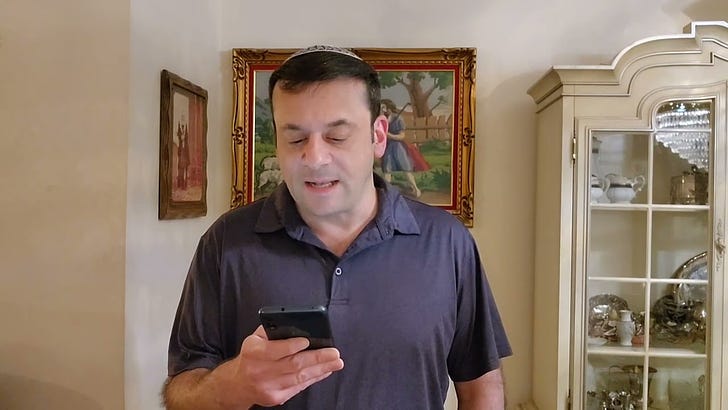A simple fact: “Morality” — as the term is used in any field other than evolutionary psychology — is bunk.
It's made up.
It's just another way of saying:
There's only so much pie to go around. So unless you can live off the Earth on your own, with snakes and rocks for friends; or unless you can find eternally perfect partners for cooperation or transaction, these are the rules of the game for pie-grabbing. Violate these rules and you're out — El Salvador, Rikers Island, or Underground — BUT OUT.
On one level, that's an incredibly honest take. It's true that each of us experience life wholly within the confines of our epidermis. Identical twins can not feel each other's pain and pleasures in voodoo doll fashion.
You're you, just you.
Lone, single, YOU.
No matter how in synch your brain waves may be with another person, or how harmoniously your emotions may vibe while watching a movie or watching your firstborn child take his first steps, there is no joint “spirit” in the world of matter that influences or binds you both.
Which brings us back to interpersonal morality.
Rambam said that what we commonly regard as interpersonal morality, whatever its murky origins may be, is nothing more than popular local beliefs about right practices and sentiments.
But, aware that my exuberance with dissecting Rambam’s original Judeo/Platonist/Arabic manuscripts can be distracting, I’ll spare you the details that would require too much backstory and, as Rambam explained his reasons for not citing others — from Moses to Aristotle to people both more and less universally acclaimed — as often as he would have liked, I promise to leave him out of the rest of this letter as well. 1
A few days ago I wrote that I would go to Gaza to discuss life with regular individuals before the eyes of all the world. 2
This is nothing new. My first published reaction to October 7th said so. 3
I didn't receive the requisite support to effectively engage the human population of the Holy Land with the safety and freedom that are obvious requirements for such an endeavor, so I remain, for now, in the Sinai Desert — awaiting that entry into the Promised Land that I hope God and you (Yes, YOU!) will grace me with. 4
All my life I have found that individual homo sapiens secretly desire that which God Himself tells us all to publicly desire: Truth and Pleasantness. 5
My innumerable intimate conversations with people of every conceivable kind have convinced me that fewer than 1 in 300 people lack either a genuinely interest to know what is true or the inborn desire to pleasantly share their brief playtime on Earth with other people. 6
“Society” however is the mob.
Society is not the conglomeration of all the good we wish for ourselves and each other, but the sum of all our fears.
And rulers are chosen by Society.
As I make sure to clarify constantly in an age that dreams of guillotines, the rulers are no more to blame than we would be in their shoes — where we would certainly act more or less the same as they do today.
What's necessary is for everybody to know that everybody knows (that everybody knows…) that Truth and Pleasantness are desired and available to us all in greatest abundance when the happy truths about ourselves and each other are common knowledge.
Moshe
email: moshejrudner@gmail.com
whatsapp: +1-760-880-1584
For those interested, the Arabic word he uses for the false guide that humanity, and nearly all humans follow, is مشهورات = common temporal conventions, which the Hebrew of Al-Harizi generally translates as מקובלות (“received” standards) and ידועות (“known” scare quotes → “truths”), that are so ingrained in each and every society and in the individuals who live therein, that they are literally simply “known” — to the point that anyone who seeks to judge them via reason, even to their merit, is deemed sinful and disgusting.
Indeed, the distinction Rambam draws between REAL Truths and mere fashionable truths is that the first kind can be demonstrated as either “True or False” (الحق / الباطل), while the latter sort people can't, don't, or even fear judging by such objective standards, but regard seemingly instinctively as “beautiful or ugly” (الحسن / القبيح).
The most common Hebrew term for such “conventional beliefs” —— brilliantly exemplified by Rambam via the Bible’s own inspired choice, is nudity and sexuality > a point so visceral that it still holds the popular imagination of all the nations’ lay theologians today as they furrow their collective brow over the connubial ages of Mohammed, Isaac, or Joseph’s wives —— according to the most accepted Hebrew translators of Rambam’s work, Ibn-Tibbon (whose translation of this concept Rambam himself almost certainly read and approved of) and Rabbi Yoseph Kapach (a tiny giant of a man who emerged out of Yemen to thunder Maimonidean demands to a grateful people who had no idea how badly we needed him) is מפורסמות - famous/published/common beliefs.
Over Passover I will be livestreaming from Gaza for 7 hours a day
Individuals want to know what is true and good, and they want to share their love of truth and goodness with other people.
Many videos make the point: From dead earnest conversations with a drug dealer in Midnight Manhattan during Covid or with a wheelchair-bound woman with her children on the dirty streets of Tijuana — to light-hearted buffoonery with crazed conspiracists on their way to (unsuccessfully) lynch newly-elected Mayor Adams of New York or a cantankerous older woman in Portugal unhappy about mask mandates. And of course there is the recent, but lengthy, hour-long video with Egyptian Islamic fundamentalists and a bereaved Gazan doctor.
To split the difference while making the point most viscerally relatable and relevant to most people reading, see this conversation with a gang member of the Latin Kings who was once televised as The FBI’s Most Wanted, for shudderworthy crimes including kidnapping and attempted murder.
I made a playlist of the complete unedited conversation by breaking it up into 6 parts, where each video should offer the following one in the YouTube endscreen, but in case it doesn't, the Yadidya Channel Homepage includes a section for playlists. The title of this one is simply: Latin King.
The first video shows how we met. I bought a new camera and I was trying it out in Union Square:






